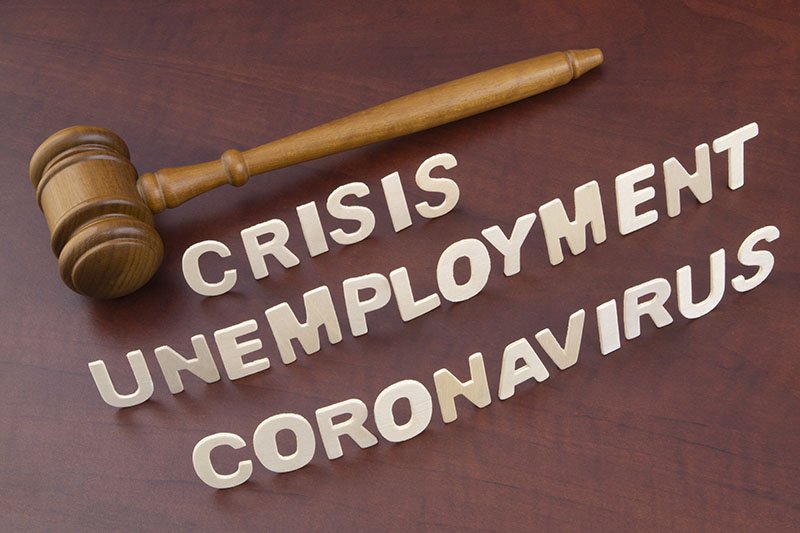
COVID-19: Expanded Unemployment Assistance Under the CARES Act Includes Help for Michigan Independent Contractors, Gig Workers, and the Self-Employed
BY: Tad T. Roumayah | IN: COVID-19, Employment Law
The COVID-19 pandemic has led to the filing of a record number of unemployment claims in a very short time.

Tens of millions of Americans – hourly workers, salaried employees, independent contractors, and the self-employed – suddenly and unexpectedly find themselves without a paycheck for the foreseeable future. In response, the Coronavirus Aid, Relief, and Economic Security (CARES) Act was signed into law on March 27, 2020, providing expanded federal unemployment benefits for individuals who are out of work due to the crisis. At the state level, Michigan has made several changes to its unemployment insurance program that can further assist laid-off or furloughed workers.
Here is what you need to know about these new federal and state unemployment compensation provisions:
- Additional $600 per week. In addition to standard unemployment benefits received through state programs, those otherwise eligible for state or federal benefits will receive an extra $600 per week.
- First week paid by federal government. In states that waive their standard one-week waiting period requirement for the receipt of benefits, the federal government will pay that first week of benefits.
- Thirteen more weeks of benefits. Individuals who remain unemployed after their state benefits run out can receive up to an additional 13 weeks of federally-funded benefits at $600 per week.
Self-Employed, Independent Contractors, and Gig Workers in Michigan Now Eligible for Benefits
One of the most significant parts of the CARES Act is the expansion of unemployment benefits to individuals who historically were ineligible to receive it.
Self-employed individuals, independent contractors, gig workers, those seeking part-time employment, and people with an insufficient work history can now apply for and obtain federally funded unemployment compensation through the Pandemic Unemployment Assistance Program.
You may be eligible for unemployment benefits under this new program if (1) you are otherwise ineligible for, or have exhausted all rights to, unemployment benefits; and (2) you are unemployed, partially unemployed, or unable to work because of any of the following COVID-19-related situations:
- You have been diagnosed with COVID-19 or have symptoms of COVID-19 and are seeking a medical diagnosis.
- A member of your household has been diagnosed with COVID-19.
- You are caring for a family member or household member who has been diagnosed with COVID-19.
- You are the primary caregiver for a child or other person in the household who cannot attend school or another facility that has been closed as a direct result of COVID-19 and you need the school or facility care in order to work.
- You are unable to reach your job because of a quarantine imposed as a direct result of COVID-19.
- You are unable to reach your job because a health care provider has advised you to self-quarantine due to COVID-19 concerns.
- You were scheduled to begin work and do not have a job or are unable to reach the job as a direct result of COVID-19.
- You have become the breadwinner or major support for a household because the head of household has died as a direct result of COVID-19.
- You have been forced to quit a job as a direct result of COVID-19.
- Your place of employment is closed as a direct result of COVID-19.
You can receive benefits under the Pandemic Unemployment Assistance program for the duration of your period of unemployment, partial unemployment, or inability to work, beginning retroactively on January 27, 2020, and ending on December 31, 2020, up to a maximum of 39 weeks.
In addition to the CARES Act, pursuant to Michigan Governor Gretchen Whitmer’s Executive Order 2020-10, the following workers are eligible for unemployment compensation:
- Individuals who leave work or are laid off due to self-isolation or self-quarantine in response to elevated risk from COVID-19 due to being immunocompromised
- Individuals displaying the symptoms of COVID-19
- Individuals having contact in the last 14 days with someone with a confirmed diagnosis of COVID-19
- Individuals with the need to care for someone with a confirmed diagnosis of COVID-19, or a family care responsibility as a result of a government directive (such as K-12 schools closing).
Apply for Michigan Unemployment Benefits
Though the federal government funds the new and expanded unemployment benefits under the CARES Act, Michigan workers seeking to access these benefits need to file their claims with Michigan’s Unemployment Insurance Agency (UIA). However, if you have already filed for benefits, you do not need to reapply to obtain CARES Act-established benefits.
As is the case in every state, Michigan’s UIA has been overwhelmed with new claims. Accordingly, it has established a filing schedule based on last names:
- Last names beginning with letters A-L should file claims on Mondays, Wednesdays, or Fridays.
- Last names beginning with letters M-Z should file claims on Sundays, Tuesdays, or Thursdays.
- Saturdays will be available to accommodate anyone who could not file during their allotted window.
If you need assistance with workplace issues or disputes, have questions about the CARES Act, or have any other employment-related concerns arising from the COVID-19 pandemic, please contact the employment law attorneys at Sommers Schwartz today. We are working remotely and are still here to help.
Tad T. Roumayah
Tad Roumayah focuses his practice primarily on employment litigation, representing employees who have encountered discrimination, retaliation, wrongful discharge, whistleblower protection claims, wage and hour violations and other employment issues and disputes.





